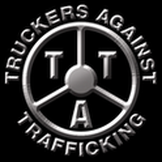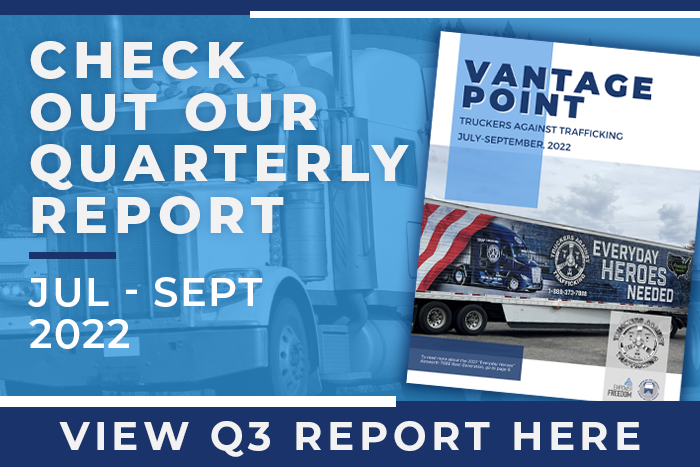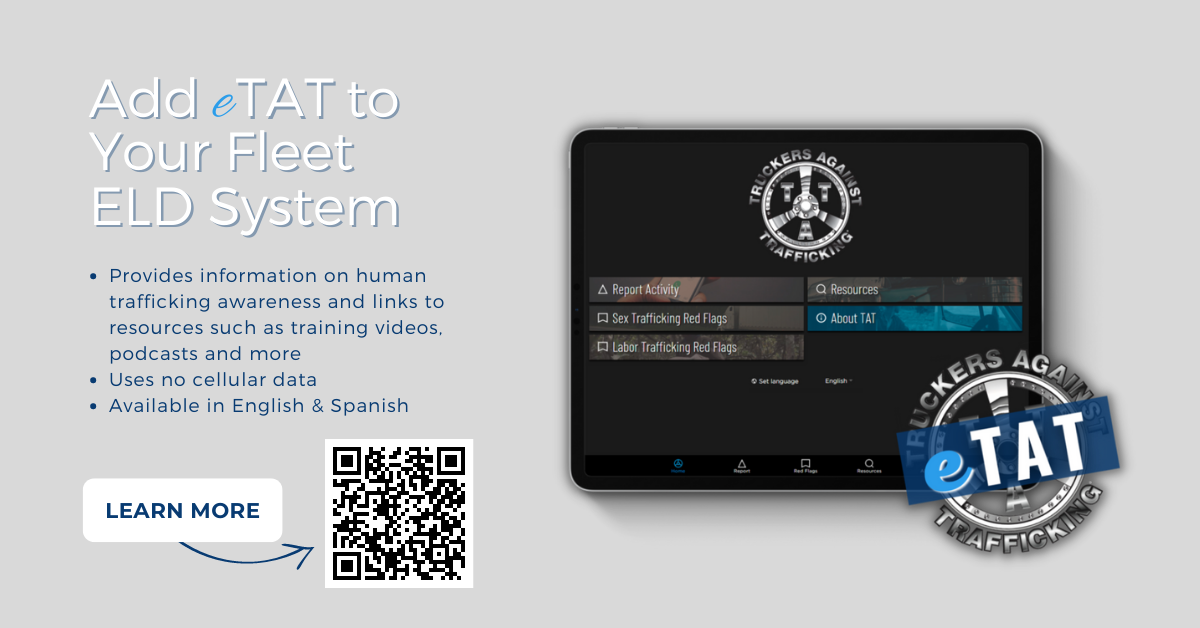TRUCKERS AGAINST TRAFFICKING
| Download PDF of Coalition Build Impact Report (Above) |

Human trafficking, a term for modern-day slavery, is a $32-billion worldwide industry with more than 20.9 million people enslaved. It has been reported in all 50 states, and the number of victims in the United States is estimated in the hundreds of thousands. This website has been created to enable members of the trucking/travel plaza industry and other travelers learn what you can do to help stop this atrocity.
Around the world, there are an estimated 20.9 million slaves today. This is more than at any other time in world history. Modern-day slavery, when it results in people being bought and sold for forced labor or commercial sex, is called human trafficking. Foreign nationals from multiple countries are trafficked into this country on an annual basis; and the U. S. Department of Justice estimates that anywhere between 100,000-300,000 American kids are at risk of entering the sex trade each year.
While illegal, human trafficking is a booming business, second only to drug trafficking. Traffickers recruit out of our schools, online, in shopping malls, as well as the streets and other locations. A large percentage of the people trafficked are women and children. Many of them are used in the sex industry. They are the prostituted people on the street and in private homes, and in legitimate businesses such as restaurants, truck stops and motels. They need to be identified and rescued.
You Can Make a Difference
This is where you come in! Truckers Against Trafficking recognizes that members of the trucking industry and individual truckers are invaluable in the fight against this heinous crime. As the eyes and ears of our nation's highways, you are in a unique position to make a difference and close loopholes to traffickers who seek to exploit our transportation system for their personal gain. This site has been created to inform truckers, truck stop operators, and other travelers of the basic issues involved in human trafficking and a summary of ways you can help. We invite you to travel through this website and learn how you can join this worthy cause and save lives.
Visit Website
Around the world, there are an estimated 20.9 million slaves today. This is more than at any other time in world history. Modern-day slavery, when it results in people being bought and sold for forced labor or commercial sex, is called human trafficking. Foreign nationals from multiple countries are trafficked into this country on an annual basis; and the U. S. Department of Justice estimates that anywhere between 100,000-300,000 American kids are at risk of entering the sex trade each year.
While illegal, human trafficking is a booming business, second only to drug trafficking. Traffickers recruit out of our schools, online, in shopping malls, as well as the streets and other locations. A large percentage of the people trafficked are women and children. Many of them are used in the sex industry. They are the prostituted people on the street and in private homes, and in legitimate businesses such as restaurants, truck stops and motels. They need to be identified and rescued.
You Can Make a Difference
This is where you come in! Truckers Against Trafficking recognizes that members of the trucking industry and individual truckers are invaluable in the fight against this heinous crime. As the eyes and ears of our nation's highways, you are in a unique position to make a difference and close loopholes to traffickers who seek to exploit our transportation system for their personal gain. This site has been created to inform truckers, truck stop operators, and other travelers of the basic issues involved in human trafficking and a summary of ways you can help. We invite you to travel through this website and learn how you can join this worthy cause and save lives.
Visit Website
Midwest Food Bank currently distributes over $18.5 million worth of food to over 1,700 non-profits each month. We stand ready for disaster relief efforts and can get food-filled relief boxes to those in need, within 24 hours. Thanks to the generosity of our donors, the valuable work of our volunteers, and most importantly, the blessings of God, Midwest Food Bank now shares the blessings worldwide. $229 million worth of food was distributed in 2018.
We desperately want to live in a world where our services are no longer needed – where the concept of hunger is foreign and a thing of the past. Until that day comes, we’ll stay in the fight, and we’d like you by our side. Our volunteers, agency partners, Share Partners, and Corporate Sponsorships enable us to grow into new locations and continue to fight hunger around the world. We need your support to continue impacting those affected by hunger. Take time to learn how we earned the highest rating through Charity Navigator, America’s premier independent charity evaluator, and consider how you can help through donation or volunteerism. Thank you for your consideration!
Visit Website
We desperately want to live in a world where our services are no longer needed – where the concept of hunger is foreign and a thing of the past. Until that day comes, we’ll stay in the fight, and we’d like you by our side. Our volunteers, agency partners, Share Partners, and Corporate Sponsorships enable us to grow into new locations and continue to fight hunger around the world. We need your support to continue impacting those affected by hunger. Take time to learn how we earned the highest rating through Charity Navigator, America’s premier independent charity evaluator, and consider how you can help through donation or volunteerism. Thank you for your consideration!
Visit Website
SmartWay is a highly successful partnership between Government and Industry to increase energy efficiency and reduce greenhouse emissions and pollution. Started in 2004 by the U.S. Environmental Protection Agency, SmartWay sets voluntary standards on “green” products and encourages suppliers to develop and refine such products.
The beauty of SmartWay is that it works. Intelligent “green products” and ideas save fuel and increase operational efficiency while also reducing fuel consumption and greenhouse gas emissions. SmartWay certified tires and under-trailer air deflectors are examples.
Visit the SmartWay website for statistics and examples of how SmartWay is transforming the industry and helping the environment far more effectively than regulatory changes.
The American Trucking Associations, through its 50 affiliated state trucking associations, conferences, councils and other organizations represents more than 37,000 members including every type of motor carrier in the United States.
ATA and its affiliates are committed to delivering a cleaner tomorrow by being active in environmental issues and promoting a bold sustainability program that will have an immediate impact on the environment. The industry plans to reduce fuel consumption by 86 billion gallons, thus reducing the carbon footprint of the trucking industry by nearly a billion tons over the next 10 years.
How will this be done?
The beauty of SmartWay is that it works. Intelligent “green products” and ideas save fuel and increase operational efficiency while also reducing fuel consumption and greenhouse gas emissions. SmartWay certified tires and under-trailer air deflectors are examples.
Visit the SmartWay website for statistics and examples of how SmartWay is transforming the industry and helping the environment far more effectively than regulatory changes.
The American Trucking Associations, through its 50 affiliated state trucking associations, conferences, councils and other organizations represents more than 37,000 members including every type of motor carrier in the United States.
ATA and its affiliates are committed to delivering a cleaner tomorrow by being active in environmental issues and promoting a bold sustainability program that will have an immediate impact on the environment. The industry plans to reduce fuel consumption by 86 billion gallons, thus reducing the carbon footprint of the trucking industry by nearly a billion tons over the next 10 years.
How will this be done?
- Reduce the national speed limit to 65 mph for all vehicles, and install truck governors to limit speeds to no more than 68 mph
- Reduce idling
- Increase fuel efficiency by encouraging participation in the U.S. EPA SmartWay® Transport Partnership Program
- Reduce congestion by improving highways, if necessary by raising the fuels tax
- Use more productive truck combinations
- Support national fuel economy standards for medium- and heavy-duty trucks




